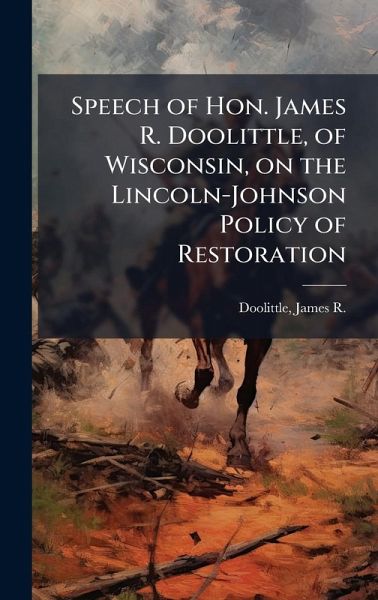
Speech of Hon. James R. Doolittle, of Wisconsin, on the Lincoln-Johnson Policy of Restoration
Versandkostenfrei!
Versandfertig in über 4 Wochen
25,99 €
inkl. MwSt.

PAYBACK Punkte
13 °P sammeln!
This is the complete text of the "Speech of Hon. James R. Doolittle, of Wisconsin, on the Lincoln-Johnson Policy of Restoration," delivered in the Senate of the United States on January 17, 1866. In this address, Senator Doolittle discusses the crucial issues surrounding the Reconstruction era following the American Civil War. Doolittle's speech offers valuable insights into the political climate and the debates concerning the reintegration of the Confederate states into the Union. He provides a detailed examination of the Lincoln-Johnson policy of restoration, a pivotal moment in American his...
This is the complete text of the "Speech of Hon. James R. Doolittle, of Wisconsin, on the Lincoln-Johnson Policy of Restoration," delivered in the Senate of the United States on January 17, 1866. In this address, Senator Doolittle discusses the crucial issues surrounding the Reconstruction era following the American Civil War. Doolittle's speech offers valuable insights into the political climate and the debates concerning the reintegration of the Confederate states into the Union. He provides a detailed examination of the Lincoln-Johnson policy of restoration, a pivotal moment in American history. This document is essential reading for anyone interested in understanding the complexities of post-Civil War America, the challenges of reunification, and the evolution of American political thought during this transformative period. This work has been selected by scholars as being culturally important, and is part of the knowledge base of civilization as we know it. This work was reproduced from the original artifact, and remains as true to the original work as possible. Therefore, you will see the original copyright references, library stamps (as most of these works have been housed in our most important libraries around the world), and other notations in the work. This work is in the public domain in the United States of America, and possibly other nations. Within the United States, you may freely copy and distribute this work, as no entity (individual or corporate) has a copyright on the body of the work. As a reproduction of a historical artifact, this work may contain missing or blurred pages, poor pictures, errant marks, etc. Scholars believe, and we concur, that this work is important enough to be preserved, reproduced, and made generally available to the public. We appreciate your support of the preservation process, and thank you for being an important part of keeping this knowledge alive and relevant.


